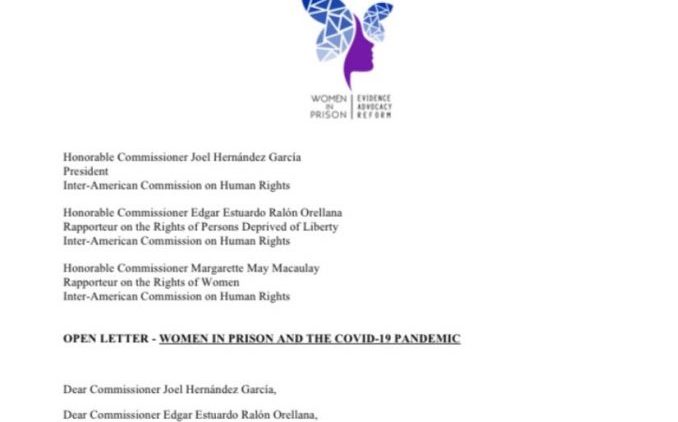Vance Center’s Network Submits Open Letters on Covid-19 Pandemic Impact on Women in Prison
July 2020
Members of the Women in Prison Network, convened by the Vance Center, submitted open letters to the African Commission on Human and Peoples’ Rights and the Inter-American Commission on Human Rights drawing attention to new research identifying the severe risks that women in detention face to their health, safety, and basic human rights as a result of the Covid-19 pandemic.
The research showed that many African governments have failed to take specific measures to allow for the release of pregnant or breastfeeding women or those with children living in prison with them. Similarly, many African countries are struggling to allocate the necessary resources and skills to provide an adequate response to the pandemic in detention centers.
In the Americas, most governments have not addressed the specific nutritional needs of women prisoners arising from the COVID-19 pandemic, and only a few countries have taken concrete steps to introduce emergency releases and actively implement non-custodial measures.
The Network letters call on the African and Inter-American Commissions to urge member states to ensure that all Covid-19 responses relating to the prison population adequately consider the special needs and unique risks of women deprived of liberty and lays out key recommendations. The Women in Prison Network includes 45 individual advocates and 34 organizations from a total of 21 countries representing every continent and is a safe space for advocates to share information and best practices, seek collaborations, and build capacity for improved monitoring and reporting of conditions in women’s prisons worldwide.
The research, part of the Vance Center’s Women in Prison Project, is based on information received from members of the Network regarding government responses to the crisis in detention centers for women. The research covered 17 Global South countries[1]and focused on six key areas: healthcare, prison protocols and rules, children in prison with their mothers, rehabilitation and release, the criminal justice system, and prison staff.
The research found most significantly that, across the Global South, the government response to the COVID-19 pandemic relating to women in prison has been patchy and inconsistent. Where actions have been taken, many appear to be targeted at the prison population in general, without proper consideration of to tailor responses to the specific needs of women prisoners.
In 2017, the Vance Center’s Human Rights and Access to Justice Program launched the Women in Prison Project to promote global collaboration on improving conditions of women’s imprisonment. It convenes women prisoners’ rights advocates from the Americas, Africa, and Asia to 1) share information about conditions of women’s imprisonment in their respective countries or regions; and 2) build capacity for improved monitoring and reporting of conditions in women’s prisons.
Examples of initiatives under the Project include:
- Convening in Bogota, Colombia, the first international conference of women prisoners’ rights advocates. The Vance Center, in partnership with Penal Reform International, brought together 49 advocates from 23 countries, including nine formerly incarcerated women. Out of this conference was created the first-ever global network of advocates for women prisoners: the Women in Prison Network.
- Conducting pilot research on women’s incarceration in Sierra Leone. The project, which the Vance Center is implementing jointly with the NGO AdvocAid of Sierra Leone, assesses the causes and consequences of women’s imprisonment in the country. Moreover, it serves as a blueprint for similar research that other organizations can conduct in their respective countries.
- The report “Women in Prison: Africa Regional Initiative”, developed in collaboration with NGOs and law firms in Nigeria, The Gambia, Malawi, Kenya, and Tanzania. The report surveys what is currently known about women’s incarceration in these five African countries, both in law and practice. It provides a detailed analysis of these countries’ compliance with domestic, regional, and international standards on women’s incarceration.
[1] Argentina, Bolivia, Brazil, Colombia, Indonesia, Kazakhstan, Kenya, Kyrgyzstan, Malawi, Mexico, Nigeria, Pakistan, Philippines, Sierra Leone, Thailand, The Gambia, and Venezuela.

